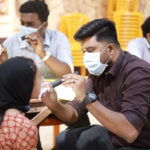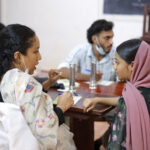Code of Ethics
CODE OF ETHICS
CHAPTER I
Code of Ethics for Professional Conduct
General Statement
The following statements are the general principles, guidelines, and code for professional conduct. The said code of ethics is binding in-full on all the students and faculty responsible for patient care at MES Dental College, Malaparamba, Palachode PO, Perinthalmanna, Malappuram (Dist.), Kerala 679338. These statements, general principles, guidelines, and code may be varied, amended, substituted and/or added from time to time as and when necessitated by the head of the institution or the principal in consultations with all the stakeholders. These statements and principles are adapted from the the Revised Dentists (Code of Ethics) Regulations, 2014 published by Indian Dental Association, Mumbai.
Statement and Principles
- Health and well-being: the primary concern is the life, general health and well-being of the patient and to provide patients with the highest quality of dental and medical care.
- Appropriate treatment: to plan treatments that deal with the specific nature of dental health for each individual patient with regards to variables such as the patient’s age, general health, underlying anatomy, and oral hygiene.
- Autonomy: the patient has the right to choose on the basis of adequate information provided and from alternative treatment plans or places. The caregivers role is to provide information in an effort to help the patient choose the most appropriate feasible treatment plan.
- Dignity: value and advocate the dignity and self-respect of patients and demonstrate respect for every individual, nursing staff, sanitary, faculty and non-teaching staff.
- Fairness: shall not exclude patients or members of the society on the basis of race, ethnicity, culture, spiritual beliefs, social or marital status, gender, sexual orientation, age, health status, lifestyle or any physical attributes.
- Accountability: should conduct themselves with honesty and integrity. They should practice within their own level of competence and should seek additional information or knowledge, help and/or supervision of superior when aspects of the care required are beyond their level of competence.
- File and records: must maintain accurate and comprehensive records of medical and dental histories, clinical findings, diagnoses, treatment plans, and performed treatments of each patient. All stakeholders must ensure confidentiality and privacy and there is no misuse of any written or electronic documents or unauthorized use or dissemination of personal or private information in such documents.
- Fees and other charges: shall clearly indicate the cost of treatment for the procedure and make an estimate of all costs likely to be incurred and informed to the patient prior to the start of any treatment.
- Relationship with pharmaceutical companies, industry or traders: shall not receive any gift in any form in kind or cash from any pharmaceutical or allied health care industries or their sales representatives.
- Misconduct: shall not be involved in immorality involving abuse of professional relationship with patient, student or faculty including sexual misconduct, verbal or physical abuse or misconduct, drug or alcohol abuse, or any other form of indiscipline.
CHAPTER II
Code of Ethics for Biomedical Research
General Statement
The following statements are the general principles, guidelines, and code for biomedical research. The said code of ethics is binding in-full on all the investigators and researchers performing or conducting any form or part of biomedical research in MES Dental College, Malaparamba, Palachode PO, Perinthalmanna, Malappuram (Dist.), Kerala 679338. It is mandatory that all research or study proposals/protocols on biomedical research are presented, cleared, permitted, monitored and certified by the independent MES Dental College Institutional Review Board (MESDC-IRB), which shall consist of the duly constituted Institutional Ethics Committee (IEC) and Research Advisory Committee (RAC), in accordance with the published Standard Operating Procedures (SOP). These statements, general principles, guidelines, and code may be varied, amended, substituted and/or added from time to time as and when necessitated by the IRB in consultations with all the stakeholders. These statements and principles are adapted from the Ethical Guidelines for Biomedical Research on Human Participants published by Director-General, Indian Council of Medical Research (ICMR), New Delhi in October 2006.
Statement and Principles
- Essentiality: the research is to be absolutely essential after consideration of all alternatives and come to the conclusion that the said research is necessary for the advancement of knowledge and benefit of all humans.
- Voluntariness and informed consent: any research participants should be fully apprised of the research methodology, purpose, duration and the impact and risk of the research on the participant and others. The participants retain the right to abstain from participation irrespective of any legal or other obligation. The IRB shall decide on the form of consent to be taken or its waiver.
- Non-exploitation: research participants should be involved irrespective of the social and economic condition or status, or literacy or educational levels. All participants should be fully apprised of all the physical and psychological dangers arising in and out of the research.
- Privacy and confidentiality: the identity, data, and records of all participants are kept confidential and no details or disclosure of their identity is allowed to anyone except for legal or procedure of law.
- Precaution and risk minimisation: due care and caution is taken at all stages of the research and experiment to ensure that the participant, environment and community are put to the minimum risk and do not suffer from any irreversible adverse effects.
- Professional competence: the research should only be conducted at all times by competent, trained and qualified persons who should act with total integrity and impartiality.
- Accountability and transparency: the research and/or experiment will be conducted in a fair, honest, impartial and transparent manner. Any conflict of interest that may exist is fully disclosed.
- Maximisation of interest and distributive justice: the research and/or experiment and its subsequent application in part or any form should benefit all human kind irrespective of the social and economic condition or status, or literacy or educational levels, or financial status, and should be applicable and accessible to the least advantaged.
- Public domain: the research and any further research emanating data, results, protocols, benefits, procedure, instrumentation will be in the public domain and are made known through scientific and other publications.
- Totality of responsibility and compliance: the investigators, researchers, IRB, and other stakeholders are responsible for professional and moral responsibility for the due observance of all the principles, guidelines and code in respect to the research or experiment conducted. All should comply to protect the dignity, rights and well being of all participants and ensure that universal ethical values and international scientific standards along with local values and customs are followed in letter and spirit.



